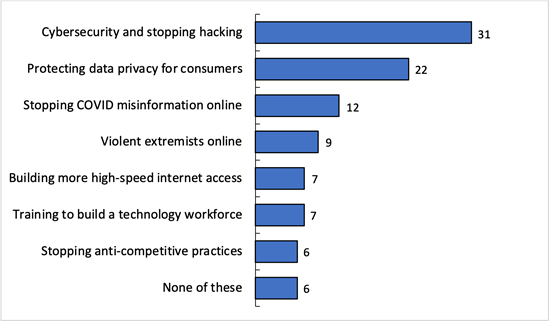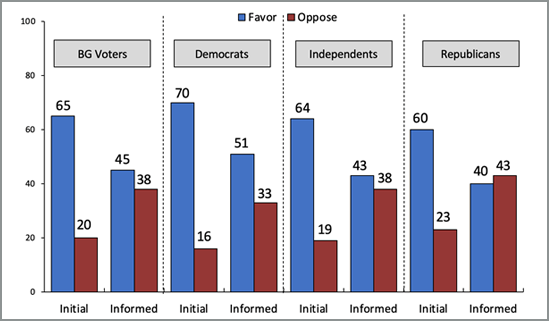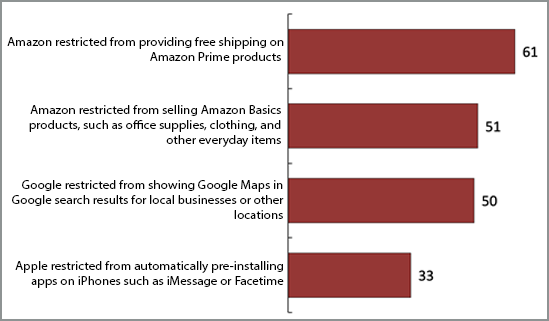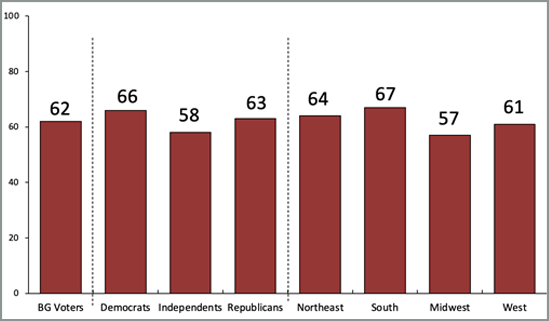Voter prioritize cybersecurity and data privacy when it comes to tech policy
Poll after poll shows that there’s broad support for some regulation of the tech industry. But where do tech regulations rank among other voter priorities? And what type of tech regulation would voters like to see? Chamber of Progress set out to answer these questions in a recent set of polls examining voter attitudes in swing states and battleground congressional districts.
Here are a few of the biggest findings:
- Democrats and Independents do not prioritize tech as a public policy issue – but when they are asked about regulatory priorities for tech, their focus is on data privacy and cybersecurity.
- After learning about the impact of antitrust legislation – hearing both arguments for and against – support swings against the legislation. Support swings towards opposition by 38 points in battleground districts and swing states.
- A majority of voters from every party believe tech competition legislation will not help them and will instead hurt consumers like themselves.
In a set of five surveys sponsored by Chamber of Progress and conducted Nov. 13-22, 2021, Normington Petts polled 800 voters in House battleground districts nationwide, 600 voters each in the swing states of Georgia, Arizona, and Colorado, and another 400 voters in Nevada. Margins of error range from ±3.5% in the House battleground poll to ±4.9% in the statewide Nevada poll.
Each poll included questions covering top national priorities, top tech policy priorities, attitudes on how the government should approach tech regulation, and reactions to tech nondiscrimination proposals currently making their way through Congress. This memo provides a summary of the findings.
Voter Priorities: Voters don’t prioritize tech, but when asked about tech policy, they support legislation to address cybersecurity and privacy.
Our polling asked voters to list their top legislative priorities. Even when given the opportunity to choose multiple issues, tech legislation was not a priority for voters.
In three of the five polls we conducted (battleground CDs, Nevada, and Georgia), Democratic respondents’ top concern was creating more clean energy. In every poll, Independents chose inflation as the top issue they wanted lawmakers to prioritize.
In each of the five polls, Democrats and Independents ranked regulation of technology companies last among their priorities.
When asked specifically what tech regulations voters would like to see lawmakers pursue, policies related to cybersecurity, data privacy, and content moderation topped the list. Cybersecurity and stopping hacking ranked first as a voter priority among voters of all parties and in all polls.

After learning about tech nondiscrimination proposals, support among Democrats and Independents deteriorates.
Voters were presented balanced arguments for and against tech competition legislation modeled after the arguments made by proponents and opponents of S. 2992.
For: Supporters of new laws to increase competition against big technology companies say that the new laws would stop the anti-competitive practice called self-preferencing, which happens when tech companies unfairly give their own products and services preference over those of its competitors, harming small businesses and consumers.
Against: Opponents of these new laws to increase competition against big technology companies say that the regulations end up hurting consumers by breaking products that people like. These new laws make it impossible for Amazon to offer Prime shipping, stop Google searches from showing Google Maps results, and mean iPhones could not come preloaded with iMessage or FaceTime.
While initial support for passing new laws to increase competition against big technology companies was high, the support proved shallow, and deteriorated after respondents heard these arguments.
Support deteriorated most sharply among Independent voters, who saw their margin of support for tech competition legislation shrink from 44 points. Among Democrats and Independents in all surveys, support for legislation similar to S. 2992 dropped by double digits.

Voters are concerned that tech competition legislation could harm them
Voters are deeply moved by the message that competition legislation would negatively impact the tech services they use. When understanding the impact on service for Google Maps, Amazon Prime, and Amazon Basics, over 50% of voters were more likely to oppose the legislation.

Most voters don’t think tech competition legislation will help them and worry that it may hurt them. This sentiment extends across parties, congressional districts, and state lines. The concern that pending tech legislation would in fact hurt everyday consumers was strongest among Democrats and Northeast and Western states.
